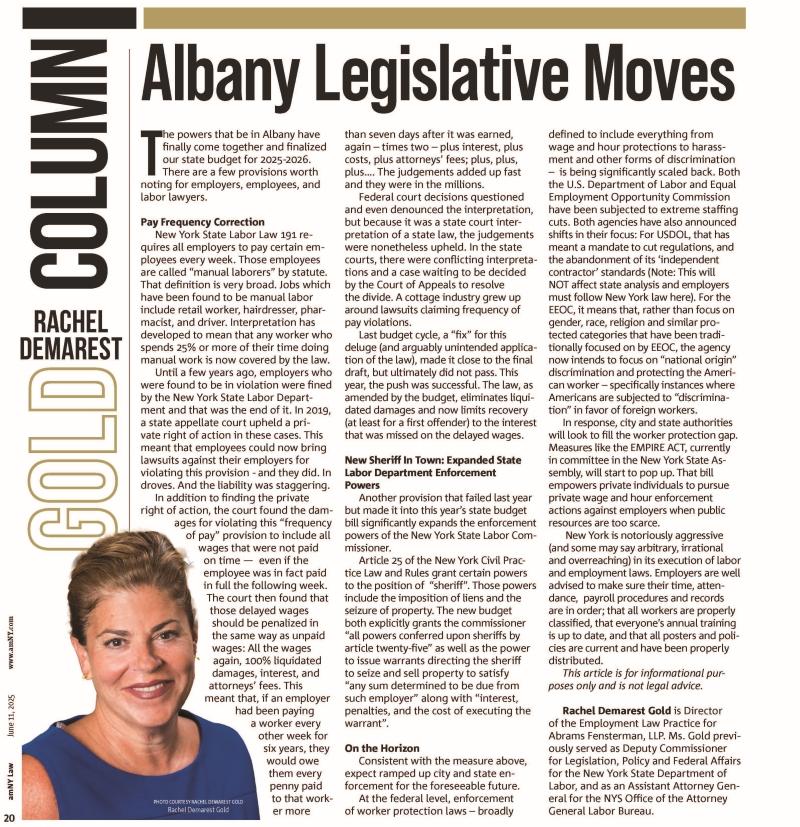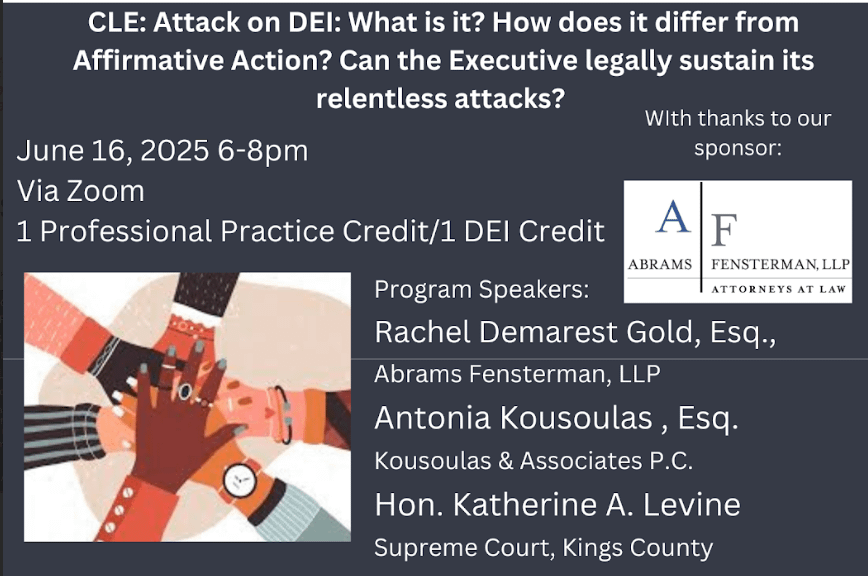By Robert Abrams
This special issue of the Journal is part of a statewide initiative to encourage members of the New York legal community to plan for themselves, their loved ones and their clients. Judges, lawyers, court personnel and many other colleagues have made the commitment to participate in this historic movement. Together we form a collegial tapestry that will help all New Yorkers prepare for the elder years.
Three members of this group are worthy of special mention: Kathryn Grant Madigan, Vincent Russo and Scott Singer. Scott inspires us by his courage and determination; Vincent motivates us with his innovation and leadership; and Kate is a visionary who provides us with guidance and encouragement to become the type of community we believe ourselves to be. Kate, Scott and Vince are wonderful people who through their efforts and willingness to meet life head on bring our collegial tapestry to life. Their lives are proof that each one of us can make a material difference.
Kathryn Grant Madigan
In her President’s message in the November/December 2007 issue of the Journal, Kate provided us with her vision for the future:
“We need a new paradigm that rejects the notion of old age as a time of inevitable decline, chronic disease and diminished capacity, and that embraces the wisdom, serenity, balanced judgment and self-knowledge that represent the fruit of long life experience.
“We also need to provide opportunities for our aging population – including older lawyers – to harvest the wisdom of their years and transmit a legacy to future generations, in whatever form is most meaningful to them – community service, pro bono work, mentoring, coaching, a work of art or literature, a song or a poem that fills the heart.
“Whether you are approaching retirement or transitioning your practice, already retired, or a Gen X or Y for whom that is a distant possibility, I encourage you to approach aging consciously, creatively, and as a new beginning. Seize every opportunity to share your wisdom and experience leaving your legacy with the next generation.”
This Journal provides proof to Kate that we have listened and learned.
Vincent Russo
Some people talk about making a difference; others do.
We have much to be grateful for in life. For us elder law attorneys, we have been given the gift of making a difference in the lives of those in need.
It was not long ago that a small group of attorneys had the vision, energy and foresight to look at our aging population and realize that seniors and people with disabilities faced challenges and that we could be part of the solution. The field of “Elder Law” was created and now hundreds of thousands of seniors benefit from our services every year.
On a personal level, it has been quite a journey. From the start, my professional career focused on serving the needs of seniors as part of a small boutique law firm in New York City. In 1985, I started my own practice, and soon thereafter my third child, Theresa, was born severely brain damaged. My life would never be the same as she crystallized for me what life is all about. We were blessed to have her for five and half years. Since that time, I have been on a mission. My focus has been on three levels: (1) serving clients, (2) educating and assisting attorneys in the practice of elder law and special needs and (3) advocating for the rights of seniors and people with special needs.
As part of my mission, I co-founded the National Academy of Elder Law Attorneys (NAELA), the Elder Law Section of the New York State Bar Association, the Academy of Special Needs Planners and Elder Counsel. All of these attorney-member organizations have one focus – Doing Well by Doing Good. I am privileged to have co-authored the New York Elder Law and Special Needs Practice treatise, which is a handbook for the practicing attorneys in New York.
Through the support of my colleagues, family and friends, my daughter’s legacy continues in our Theresa Foundation. We support music, dance, art and recreation programs locally, and around the country. Recently, we formed The Theresa Academy of Performing Arts for Children with Special Needs; the Foundation now has its own “Theresa Pooled Trust.”
We can stand tall as we reflect on what we have done as elder law attorneys but we must also continue to lead as the challenges seniors face today adversely impact on their quality of life. Many thanks to the elder law attorneys who have taken the time to help seniors and people with special needs.
Vincent is one of several New York attorneys who have helped improve the quality of life for millions of older persons and individuals with special needs throughout the country.
Scott Singer
A doctor once told me we are all TAs – temporarily ambulatory. I think of this comment often – Scott lives it every day.
My name is Scott Singer. I am the Clerk-in-Charge of the Guardianship and Fiduciary Support Office in the New York State Supreme Court, New York County. In 1990, when I was 34, I was diagnosed with Multiple Sclerosis (MS). MS is an auto-immune disease of the central nervous system (CNS), the exact cause of which is unknown. In persons with MS, the body’s immune system attacks the fatty insulation surrounding nerve fibers. These attacks lead to damage to the nerve’s capacity to carry impulses through the CNS. The course of MS is unpredictable and its symptoms vary between persons.
In 1990, my symptoms, mostly numbness and tingling in my hands, were mild and invisible. Today, some 21 years later, I have a secondary progressive form of MS. My symptoms include leg and arm weakness, foot drop, spasticity, fatigue and thermosensitivity. I began regularly using a cane six years ago, then a scooter two years ago and crutches about a year ago.
As I became increasingly mobility impaired, I became more acutely aware of the challenges that faced me in my everyday world.
Although many barriers have been lifted due to the passage of the Americans with Disabilities Act, there are still many obstacles to accessibility. I will provide some examples of the challenges I encounter.
My family and I formerly lived on the first floor of a pre-war cooperative, but that apartment was not handicap accessible, as the building’s primary entrance and lobby had stairs. Knowing that I needed a scooter, I called the New York City Commission on Human Rights Equal Access program. I met with an Equal Access staff person who conducted an evaluation. I was advised that accommodations for entry to the first floor were neither practical nor economically feasible. Fortunately, an apartment on an upper floor in the same building became available, and we purchased it. I can now enter the building on my scooter through a service ramp via the basement and take the elevator to the floor on which I live. Within a year after I moved, the co-op board, on its own initiative, installed an automatic basement door, not only making it easier for me to enter and exit the building, but also making it easier for other residents bringing grocery carts and bicycles in and out of the building.
Another challenge became going to the supermarket. My local supermarket has a cart corral that limits my access into and out of the store. I can call a manager to open the corral to give me access, but once inside, I have a hard time navigating the narrow aisles cluttered with boxes of merchandise waiting to be shelved.
I live by a wonderful neighborhood theatre showcasing foreign and art cinema. Several of their screens are on the second and third floor. I typically will drive to the theatre, park, and then very cautiously and deliberately climb one or two flights of stairs. It is usually worth the effort.
Street parking can be a problem if I do not have enough room to take my scooter out of the back of my car. Vacationing can often be a challenge. Restaurants and small stores in small towns in upstate New York and New England are not very accessible to the disabled.
Although challenged, persons with MS can certainly lead productive, vibrant and fulfilling lives. It is important for me to keep showing up even though I face many challenges.
I have always derived great satisfaction from work. My job has taken on a greater importance for me. I will continue to work as long I can remain productive and readily fulfill my responsibilities.
Scott’s life demonstrates that we are all susceptible to challenging chronic conditions that could forever change our lives and the lives of the people we love. Some may be the result of aging; some may be related to particular health issues. The point is, these conditions can challenge us, but they don’t have to devastate us.
Reprinted with permission from: New York State Bar Association Journal, July/August 2011, Vol. 83, No. 6, published by the New York State Bar Association, One Elk Street, Albany, NY 12207.





